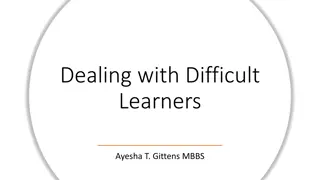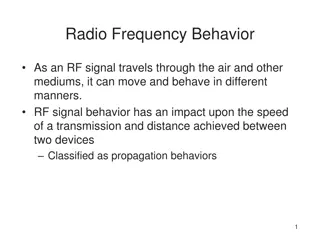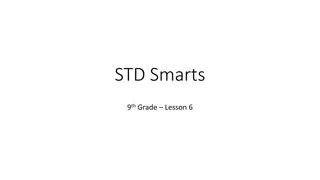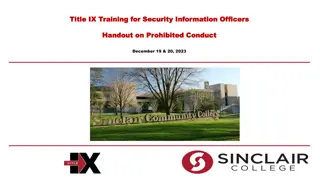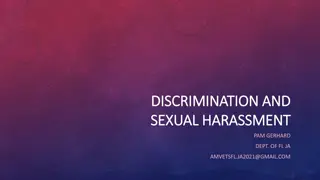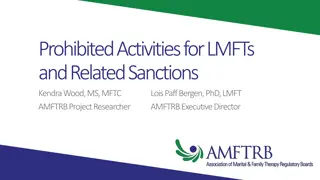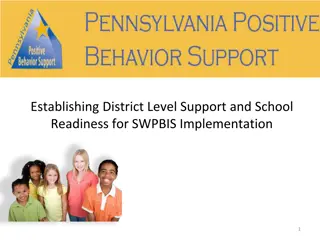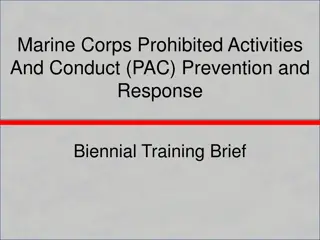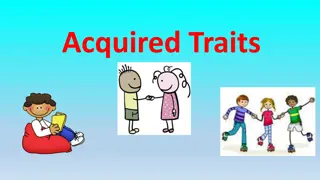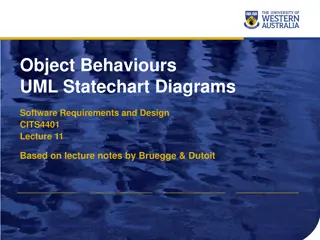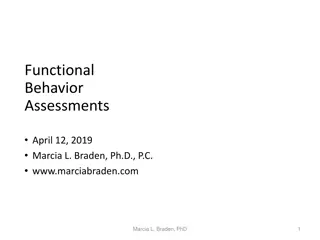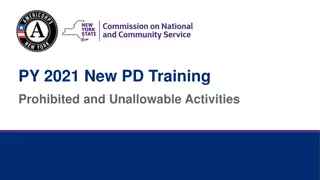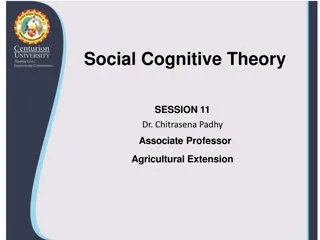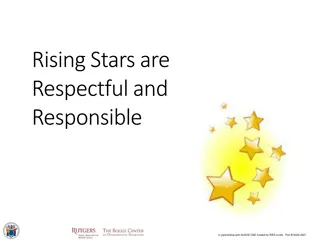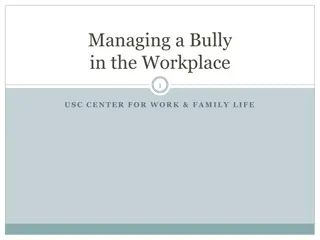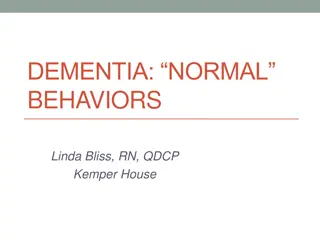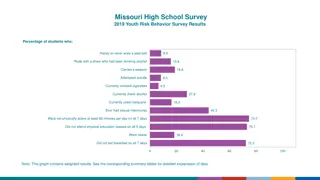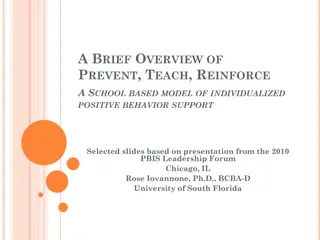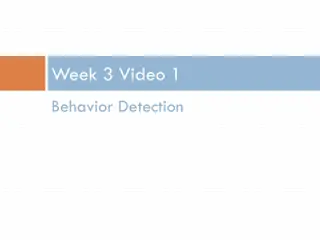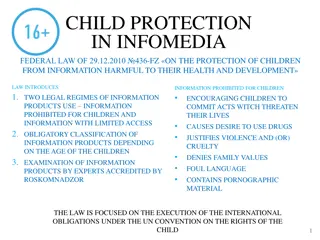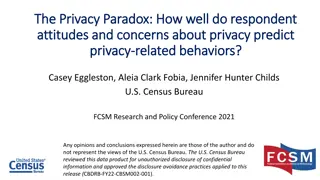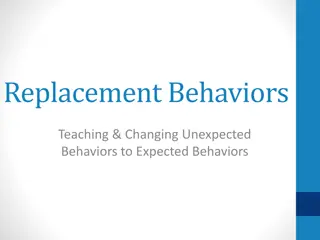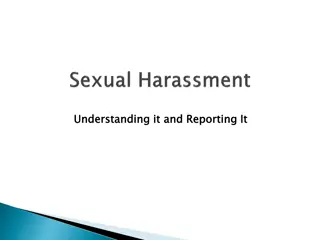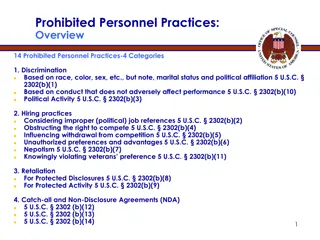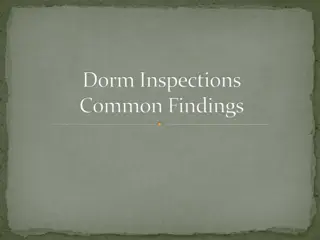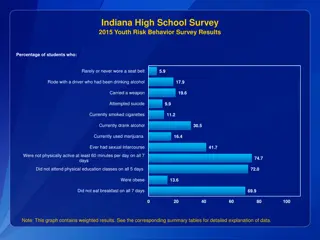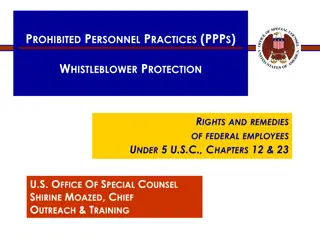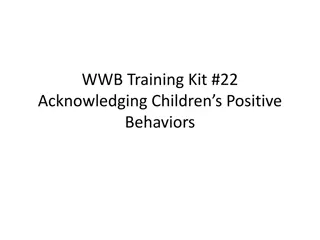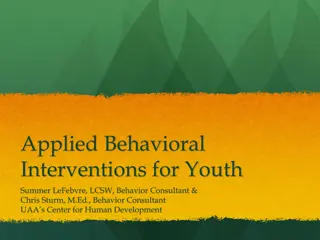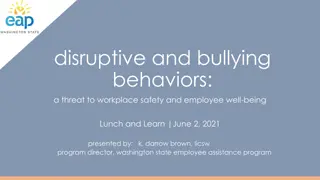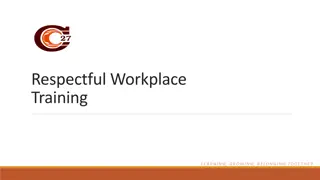Student Conduct & Title IX
Student conduct policies and Title IX regulations at Laredo College. Find information on prohibited behaviors, disciplinary actions, and resources for reporting misconduct.
4 views • 25 slides
Understanding and Managing Difficult Learner Behaviors in Adult Education
Dealing with difficult learners in adult education settings can impact the learning experience for all. This guide covers types of challenging behaviors, identifying underlying causes, and strategies for maintaining a constructive educational environment. By addressing disruptive behaviors effective
1 views • 32 slides
Understanding Changes in Domestic Abuse Practices Over the Last 2 Years
In the realm of domestic abuse and coercive control, there have been notable developments in practice over the past two years. From defining behaviors that constitute domestic abuse to recognizing economic abuse and the impact of coercive and controlling behaviors, the legal landscape has evolved to
6 views • 30 slides
Understanding Radio Frequency Behavior and Propagation Behaviors
Radio frequency signals exhibit various behaviors as they travel through different mediums, affecting transmission speed and distance between devices. Propagation behaviors include absorption, reflection, scattering, refraction, and diffraction, impacting wireless network performance. Understanding
2 views • 32 slides
STD Smarts 9th Grade Lesson: Risky Behaviors and STD Testing
In this 9th grade lesson on STD Smarts, students explore risky behaviors related to STD transmission and delve into the importance of STD testing. The lesson covers various scenarios and myths surrounding STDs, challenging students to consider their choices and knowledge about sexual health. Through
0 views • 32 slides
Understanding Sexual Violence and Harassment in Educational Settings
Sexual violence and harassment, including rape, sexual assault, and unwanted sexual behaviors, are serious issues that can affect anyone. This content highlights what sexual violence is, who can experience it, and the impact it has on students in educational environments. It also covers sexual haras
1 views • 27 slides
Understanding Prohibited Conduct in Title IX Training
This handout provides information on various forms of prohibited conduct under Title IX training for Security Information Officers. It covers topics such as quid pro quo sexual harassment, unwelcome conduct sexual harassment, sexual assault, dating violence, and domestic violence. Examples and defin
1 views • 13 slides
Understanding Discrimination and Sexual Harassment Policy in AMVETS
This content provides insights into the policy and definitions of discrimination, sexual harassment, and examples within the context of AMVETS organization. It explains the prohibited behaviors, such as gender-based harassment, and outlines the scope of the policy in addressing discrimination based
1 views • 19 slides
Prohibited Activities for LMFTs and Related Sanctions Overview
This research delves into the prohibited activities for LMFTs, sanctions for violations, and factors influencing sanction decision-making. It covers common violations like practicing without a valid license, substance abuse issues, inappropriate relationships with clients, and misleading advertising
0 views • 34 slides
SWPBIS Implementation: Establishing District Support and School Readiness
Positive Behavioral Interventions and Supports (PBIS) focuses on creating effective environments to encourage appropriate behaviors. SWPBIS extends this approach to whole schools, applying systemic strategies to achieve positive outcomes and prevent problem behaviors. It is not a quick fix or just a
2 views • 18 slides
Understanding Multiple Baseline Designs in Behavioral Experiments
Multiple Baseline Designs are a type of experimental design used in behavioral research. This design involves measuring two or more behaviors concurrently in a baseline condition, applying a treatment variable to one behavior at a time while maintaining baseline conditions for others, and then seque
0 views • 34 slides
Marine Corps Prohibited Activities and Conduct (PAC) Training Overview
This training provides insights into Marine Corps' intent, policies, and punitive provisions regarding prohibited activities and conduct. It covers effects of PAC on individuals and units, reporting options, roles, responsibilities, and climate assessment. The objective is to foster a professional,
1 views • 45 slides
Managing Difficult Employees and Disruptive Behaviors
Identify common types of difficult and disruptive employee behaviors, discuss the potential impact on the organization, and offer tips for constructive management in the workplace. Explore behaviors like gossiping, incivility, bullying, insubordination, and arrogance. Understand the metrics and lega
1 views • 20 slides
Understanding Acquired Traits and Learned Behaviors in Living Organisms
Acquired traits are physical characteristics acquired during a living thing's lifetime, such as scars, and are not passed down from parents. Many acquired traits are also learned behaviors, like reading or flying, which animals develop after birth. Learned behaviors, unlike inherited instincts, are
5 views • 15 slides
Understanding Object Behaviors and Statechart Diagrams in Software Design
Object behaviors and UML statechart diagrams play a crucial role in software requirements and design. State machines, transitions, events, and states are essential concepts in modeling object behavior in response to external events. By utilizing UML statechart diagrams, one can effectively represent
0 views • 23 slides
Understanding Functional Behavior Assessments for Supporting Students
Functional Behavior Assessments (FBAs) play a crucial role in supporting students with behavioral needs by identifying the reasons behind inappropriate behaviors. This approach, led by professionals like Marcia L. Braden, Ph.D., helps define interventions, prevent problems, and teach alternative beh
1 views • 51 slides
Prohibited and Unallowable Activities in AmeriCorps Programs
The content outlines the prohibited activities that staff, members, and volunteers supported by AmeriCorps programs or CNCS grants cannot engage in. These activities range from influencing legislation to partisan political actions, religious proselytization, and providing direct benefits to certain
0 views • 21 slides
Understanding Social Cognitive Theory: Insights from Albert Bandura
Social Cognitive Theory, developed by Albert Bandura, emphasizes learning through observation and modeling behaviors. The theory explores how individuals acquire new behaviors, thoughts, and attitudes by observing others. Bandura's famous Bobo doll experiment showcased how children imitated aggressi
6 views • 17 slides
Encouraging Responsible Behaviors in Students - Partnership with NJDOE
Promote responsible behaviors among students with engaging activities and worksheets funded by IDEA funds in collaboration with NJDOE. Students learn to arrive on time, keep track of materials, admit to mistakes, and more, fostering a culture of responsibility and accountability. Explore examples, i
1 views • 26 slides
Dealing with Workplace Bullies: A Comprehensive Guide
Workplace bullying is driven by power dynamics and can manifest through various behaviors such as sabotage, insults, and humiliation. Understanding the motivations and behaviors of bullies is crucial in recognizing and effectively managing their actions in the workplace. This guide delves into ident
2 views • 17 slides
Workplace Violence and Harassment Prevention Training at State University of New York at Cobleskill
Workplace violence and harassment prevention training at State University of New York at Cobleskill emphasizes the importance of creating a safe environment by addressing prohibited conduct, identifying risk factors, and discussing strategies to prevent violence in the workplace. From understanding
2 views • 41 slides
Understanding Normal Behaviors in Dementia Care
Dementia presents a range of normal behaviors that can be challenging for caregivers. By learning to identify triggers, interpret communication, and respond effectively, caregivers can provide better support for individuals with dementia. This session explores common behaviors like aggression, wande
0 views • 29 slides
Missouri High School Survey 2019 Youth Risk Behavior Results
This survey presents key percentages and numbers of high school students in Missouri regarding risky behaviors such as seat belt usage, alcohol and drug consumption, physical activity, and more. It outlines the prevalence of behaviors like not wearing a seat belt, riding with a driver under the infl
0 views • 4 slides
School-Based Model of Individualized Positive Behavior Support
A brief overview of the Prevent-Teach-Reinforce (PTR) model presented at the 2010 PBIS Leadership Forum in Chicago, highlighting the 5-step Tier 3 support model, critical components of behavior support, team evaluation, goal setting, and operational definitions of behaviors and replacements. The mod
0 views • 24 slides
Understanding Behavior Detection Models in Educational Settings
Explore how behavior detectors automatically infer student behaviors from interaction logs, such as disengaged behaviors like Gaming the System and Off-Task Behavior, as well as Self-Regulated Learning (SRL) behaviors like Help Avoidance and Persistence. Discover the goal of identifying these behavi
0 views • 18 slides
Child Protection Laws in Russia and Enforcement Mechanisms
The Federal Laws of Russia focus on protecting children from harmful information by introducing legal regimes, mandatory classification of information products, and expert examinations. The laws prohibit content encouraging dangerous behaviors or undermining family values. Weekly monitoring detects
0 views • 10 slides
Understanding the Privacy Paradox: Attitudes vs. Behaviors
Social scientists have identified a Privacy Paradox where individuals with strong privacy concerns may not always engage in behaviors that protect their privacy. While some studies show a discrepancy between attitudes and behaviors, others suggest that privacy-concerned individuals do employ privacy
0 views • 14 slides
Understanding Replacement Behaviors in Behavioral Interventions
Dive into the concept of replacement behaviors in behavior modification strategies. Learn how to identify, teach, and implement expected behaviors to replace unwanted actions. Discover the role of the Child Study Team in developing action plans, prioritizing behaviors, and evaluating progress. Explo
0 views • 30 slides
Understanding Harassment Laws in Employment
Learn about the legal definitions of harassment, including examples of prohibited behaviors, federal and state laws protecting employees, and actions that constitute harassment in the workplace. Understand the importance of recognizing and reporting harassment to create a safe and inclusive work env
0 views • 21 slides
Overview of Prohibited Personnel Practices and Whistleblower Protection Act
This overview outlines the 14 prohibited personnel practices, such as discrimination, hiring offenses, retaliation, and catch-all agreements, under 5 U.S.C. 2302(b). It also highlights the Whistleblower Protection Act of 2017 and the key statutory requirements related to improper access of medical r
0 views • 8 slides
Common Dorm Inspection Findings: Safety Violations and Prohibited Items
Discover common safety violations and prohibited items found during dorm inspections, including issues with electrical setups, covered smoke detectors, extension cords, power strips, trash disposal, air fresheners, and banned appliances like industrial freezers. Stay compliant with regulations to en
0 views • 7 slides
Indiana High School Survey 2015 Youth Risk Behavior Results
The Indiana High School Survey 2015 provides valuable insights into the risk behaviors of high school students in Indiana. The survey results reveal concerning percentages of students who engage in behaviors such as not wearing seat belts, riding with drivers who have consumed alcohol, carrying weap
0 views • 4 slides
Understanding Title VI of the Civil Rights Act
This content discusses the importance of Title VI training to comply with federal regulations. It covers the purpose of Title VI of the Civil Rights Act of 1964, prohibited actions, and the Language Assistance Plan. Employees will learn to define Title VI, identify prohibited actions, understand the
0 views • 12 slides
Federal Employee Whistleblower Protection and Prohibited Personnel Practices Overview
Federal employees are protected against prohibited personnel practices through whistleblower rights and remedies under United States Code. The Office of Special Counsel investigates and seeks corrective actions for prohibited practices. Key concepts include merit system principles and the framework
0 views • 23 slides
Understanding Positive Behavior Acknowledgment in Children
Acknowledging children's positive behaviors is crucial for reinforcing desired behavior patterns. Positive responses help in promoting positive interactions, following instructions, proper communication, and independent self-care skills. It is important to recognize and praise positive behaviors to
0 views • 11 slides
Understanding Applied Behavior Analysis (ABA) for Youth Interventions
Applied Behavior Analysis (ABA) is a science focusing on improving human behavior by increasing desired behaviors, teaching new skills, and generalizing behaviors. ABA emphasizes observable behaviors, measurement of behavior change, and the use of interventions in various settings like classrooms an
0 views • 25 slides
Understanding Fair Housing Laws: Essentials and Protections
Explore the essentials of fair housing laws, including protected classes, covered entities, prohibited conduct, illegal behaviors, and discriminatory advertising. Learn about CNY Fair Housing's role in investigating housing discrimination and providing legal representation, as well as the specific c
0 views • 25 slides
Understanding Title IX for New Faculty at FSU
Title IX ensures gender equity in education by prohibiting sex discrimination, harassment, and violence in educational settings receiving federal financial assistance. This orientation session covers the definition of Title IX, its application to students, faculty, and visitors on and off-campus, an
0 views • 29 slides
Workplace Safety and Well-being Lunch and Learn Event Overview
This Lunch and Learn event held on June 2, 2021, addressed disruptive and bullying behaviors as threats to workplace safety and employee well-being. Key topics included identifying, addressing, and discussing such behaviors, along with statistics on civility in the workplace and challenges faced due
0 views • 26 slides
Understanding Workplace Harassment and Bullying Training
In this workplace training session, participants will learn about bullying, harassment, and discriminatory behavior in the workplace. The session covers the definition of bullying and harassment, the laws and policies in place, respective roles and responsibilities, reporting procedures, and example
0 views • 18 slides

